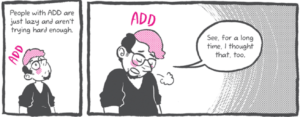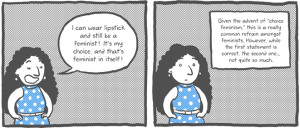“She’s wearing that?”
“She’s so bossy.”
“She sleeps around. She must be so desperate.”
“She put on so much weight. It’s a shame, she was so pretty before!”
Sound familiar?
Try as we might, even the most conscientious feminists can slip into a sexist train of thought now and then, no matter how well-intentioned.
It’s natural that your first response might be to panic a bit, especially if you’re new to feminism. Since feminism is about supporting all women and their decisions, backsliding into casual sexism can feel like a heavy offense.
But don’t resign yourself to having your feminist card revoked just yet. Fear not, guilt ridden feminists!
It’s time for a little Q&A to break down those sexist thoughts and the forces that create them.
Q: I find myself judging women. Am I a bad feminist?
A: Not necessarily – but you also have to think about why you’re having a negative reaction.
Whether it’s a woman’s outfit or her voice or her demeanor, we’ve all been in a situation where we’ve judged other women harshly.
And given our socialization, does that really come as a surprise?
Women are taught to perceive each other as constant competition.
Looking down on a woman for her appearance or how she carries herself feels suspiciously similar to girl hate. Such scrutiny doesn’t align well with feminist values.
However, it’s important not to write these impulse reactions off as simple pettiness. Why do you feel so strongly about another woman’s appearance? Her voice can’t be that bothersome.
Think about your reasoning for criticizing her.
Take hating a woman’s outfit, for example. If you don’t like it because you wouldn’t wear it, that’s one thing, but if you don’t like it because you think it makes her look trashy, that’s probably more deeply rooted in misogyny.
There’s also a strong possibility that you’re jealous of her.
Since women learn to always be competitive with each other, another woman being more attractive or successful than us can feel threatening. Thus, we might compensate for these feelings of inadequacy by projecting sexist thoughts back onto the threat.
It’s crucial that you separate differences in taste and personality from prejudice. You’re not an irredeemable sexist for being apathetic about someone’s skirt, but if you find your issues stem from preconceived notions about how women should dress or act, that’s indicative that you have a little self-introspection to do.
Q: But why am I still thinking like this if I’m a feminist?
A: You’re responding to the patriarchal culture that you’ve lived in your whole life.
I wish that becoming a feminist was a simple flick of the switch. Imagine that – as soon as you chose to identify as a feminist, all your problematic and fucked up worldviews would magically disintegrate.
Sadly, it’s just not that easy. Wrestling with patriarchal residue is a never-ending process. It takes constant work and self-examination.
I think a lot of new feminists beat themselves up because they jump in excited and chomping at the bit to embrace everyone wholeheartedly – and then become immediately discouraged when they fall back into old habits.
I’m here to tell you that it’s okay!
You can’t expect yourself to undo decades of social messaging overnight. That would be putting way too much pressure on yourself.
The reason that I picked clothes and voice to exemplify our tendencies to judge other women is because both of those areas directly reflect misogynistic thinking imparted on us by the patriarchy.
When we say a woman’s clothes give off the impression that she’s trashy (which is most often a euphemism for slutty), there’s a significant sexual undertone. We’re insinuating that her appearance designates her as unworthy of respect because of what she presumably chooses to do with her body. That suspicion is heavily tied into patriarchal views of morality and chastity for women.
The same principle is at play for hostility around women’s voices and speaking patterns. When we make fun of women’s voices for being shrill or overly feminine, we’re really mocking femininity. Girls are taught that they must master femininity to achieve true womanhood, and yet the same time, excessive femininity is seen as degrading and farcical.
Given this whirlpool of toxic ideology, it’s not surprising that feminists revert to patterns of misogynistic thinking.
You’re not still having sexist thoughts because you’re a subpar feminist, you’re having sexist thoughts because you’re still immersed in a patriarchal climate.
Q: Can I disagree with a woman’s choices and still be a feminist?
A: Of course! Disagreements are only human.
Part of the reason why people are skeptical of feminism to begin with is because they think it’s an unrealistic hippie fantasy of all the women of the world holding hands and singing for the rest of their lives.
Feminists tend to internalize this stereotype and feel pressured to be vocally supportive of every decision every woman in their life makes. They think that being uncomfortable with a woman’s choices makes them sexist or that they have to flat-out adore every woman to be a true feminist.
I’m going to save you a lot of grief and tell you that that’s just not going to happen. There are plenty of women that I don’t get along with, and it has nothing to do with their gender. Incompatible personalities are just incompatible regardless.
By the same token, some women are going to make life decisions where you’re going to repeatedly think to yourself “I would never do that!”
Maybe it’s a job that she took, maybe it’s a choice she made with family planning, or maybe it’s something silly like an extreme hobby that you don’t understand (I’m looking at you, skydivers).
However, disapproving of a woman’s choices doesn’t automatically make you antifeminist. It depends on the context.
If you’re uncomfortable because what she’s doing doesn’t align with your views on sex or womanhood, again, you might want to take some time to work through that.
Ultimately though, a certain degree of discomfort or disapproval is inevitable in all our relationships. You aren’t required to poop rainbows of enthusiasm every time a woman does something to prove your feminism.
That’s not real life.
Q: Sometimes I feel like I don’t fit what a feminist should be because of having sexist thoughts. How can I change this way of thinking?
A: Reconsider your definition of a “good feminist.”
I was going to open my explanation with the cheerful assertion that “there’s no wrong way to be a feminist,” but unfortunately that’s not true. Feminism has a lot of problematic aspects – particularly the prominence of racism, lesbophobia, ableism, and many other forms of discrimination in mainstream white feminism.
Hold onto that thought for a second.
Feminists have this idea of how they should be. If they don’t check every box, they are a failure. “Good feminists” behave a certain way and do certain things.
Supposedly.
It’s like the age-old debate of whether or not feminists should shave their legs. Some people think that shaving your legs indicates that you’re still dictating your life around patriarchal beauty standards. Truly liberating yourself means shunning traditional femininity.
Still others insist that they simply prefer shaving or wearing makeup, and it has nothing to do with conforming to mainstream expectations. They point out that other more radical feminists are being sexist by trying to control how other women present themselves and looking down on them for their appearance.
If you’re trying to be a “good feminist,” you’re comparing yourself to other women and putting them in an imaginary superiority hierarchy in order to chase an impossible standard – which doesn’t feel all that different from tired misogyny.
The reason that these kinds of competitions among feminists are so exhausting is because everyone is trying to tell each other how women should behave and present themselves, which completely negates the entire purpose of feminism!
Even feminists don’t have the right to decide who is a bad feminist and who isn’t.
Cut yourself some slack. Change this toxic outlook by reprioritizing your goals as a feminist.
Being a good feminist has nothing to do with whether or not you adhere to whatever qualities or mindset you believe a feminist should have. What really matters is the quality and inclusivity of your feminism in itself.
As I said, mainstream feminism has a lot of issues. It’s your job as a feminist to make your feminism as intersectional as possible – that means supporting women of color, lesbians, disabled women, poor women, trans women, and women of any other marginalized identity.
Such mindfulness will carry you a lot further than wasting all your energy worrying about every time you’ve had a sexist thought.
Q: Can I have sexist thoughts and still be a feminist?
A: Absolutely.
Sexism is complicated. The unlearning process will take a long time, and there will definitely be some ideological growing pains.
With that said, feminism is an evolution. If you fixate all your attention on keeping score of all your slipups, you’re hindering your ability to educate yourself.
Being a feminist isn’t about never making a mistake. It’s about recognizing when you do and having the ability to move beyond that or rise above that logic. Make sure your actions speak louder than your original impulses.
Sexism and feminism can be incredibly difficult to reconcile, but it is possible.
You’re never going to be able to eradicate every single sexist thought from your mind, so let go of that anxiety. You’re always going to have a few sexist thoughts. The ultimate goal should not be to never have them again, but to realize that you’re having them and act according to your feminist values.
At the end of the day, what matters most is our commitment to empowering other women.
No feminist is perfect, but that doesn’t mean we are not feminists.
[do_widget id=”text-101″]
Erin Tatum is a Contributing Writer at Everyday Feminism. She’s a feminist, queer theory lover, and television enthusiast living in Pennsylvania. She is particularly interested in examining the representation of marginalized identities in media. In addition to Everyday Feminism, she’s also a weekly contributor to B*tch Flicks. Follow her on Twitter @ErinTatum91.
Search our 3000+ articles!
Read our articles about:
Our online racial justice training
Used by hundreds of universities, non-profits, and businesses.
Click to learn more
Most Read Articles
- « Previous
- 1
- …
- 30
- 31
- 32




















